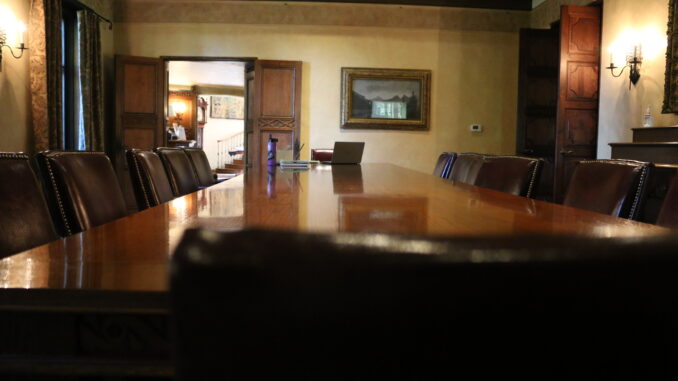
Despite deciding to divest from fossil fuels in 2018, the Lewis & Clark Board of Trustees (BoT) voted to roll back on this decision in October 2022, shifting to a different model. The change in plans was not publicized. Students Engaged in Eco-Defense (SEED) plan to release a document on LC’s history of fossil fuel investment policies, and where the administration can go from here.
The 2018 decision followed weeks of student protests, a petition by SEED with over 900 signatures and a wave of college divestments. According to the New York Times, over 1,500 institutions have divested from fossil fuels in the past five years, including hundreds of the world’s top universities, the British crown, major banks, and the Norwegian Sovereign Wealth Fund, which is the world’s largest investment portfolio. Following LC’s decision, SEED and the BoT discussed what a divestment policy would look like.
Divesting means that LC’s endowment would no longer be invested in the fossil fuel industry. An endowment is a permanent fund held by a private college, made out of donated money and invested in the stock market. It serves as a “rainy-day fund” and a barometer of the school’s overall financial health. As of May 31, 2022, LC’s endowment was valued at $319.4 million, according to the college’s business office, or about $150,000 per undergraduate student. This is the third-largest endowment for an Oregon college, behind Willamette University in second place and Reed in first, and is an average size for a prestigious liberal arts school.
In October 2022, the BoT quietly voted to shift from a divestment model to a net-zero model, in which they could continue investing the endowment in fossil fuels so long as the investments are balanced out with investments in environmentally friendly businesses.
According to SEED’s incoming Vice President Clover Sinning ’26, the BoT did not inform SEED about the policy change.
“It was October when the Board of Trustees voted to switch from the divestment policy,” Sinning said “And I don’t think we were emailed until a couple months later. Even at this point, I think awareness is quite low. And we haven’t actually been able to find all the information from that decision that was made.”
SEED was never directly contacted by the trustees about the decision. A professor was the first to inform them about the change to the policy. SEED’s leadership, including Treasurer Bella Root ’25, were frustrated by the lack of transparency from the administration.
“We found out in a really roundabout way,” said Root.
SEED is preparing a document informing students of the change, which will likely be released shortly after the publishing of this article.
While Root and Sinning welcomed the potential of the net-zero model, which examines the ecological consequences of every company and portfolio LC invests in rather than just fossil fuel companies, they also suggested the Trustees may have had ulterior motives for the switch.
“In the policy that SEED helped them add to the endowment guidelines, it said they had to sell all their investments in fossil fuels by December 2022,” Root said. “And they made that change in October.”
According to SEED, by Dec. 31, 1.7% of LC’s endowment was still in private investment pools that invest in fossil fuels, meaning a total of $5.2 million are exposed to fossil fuel stocks.
There are no plans to phase out these investments. Nevertheless, the school’s Environmental Sustainability Office said that the net-zero clause is an improvement over the divestment clause in terms of climate impact, as it takes a broader approach to emissions mitigation than simply dropping fossil fuel stocks.
Chief Financial Officer and Vice President of Operations Andrea Dooley wrote that “Today, net-zero is regarded as a more active solution, whereas divesting is regarded as a passive approach to climate change.”
Whatever the outcome of the administration’s decision, SEED wants students to be aware of what the administration is doing with their money.
“We’re trying to direct the school towards what the students want in terms of sustainability,” Root said. “It’s really the student body’s job to hold Lewis & Clark accountable for being sustainable and actually following through on a lot of their promises as a sustainable college, as that is how they market themselves to us.”
Subscribe to the Mossy Log Newsletter
Stay up to date with the goings-on at Lewis & Clark! Get the top stories or your favorite section delivered to your inbox whenever we release a new issue.

Leave a Reply